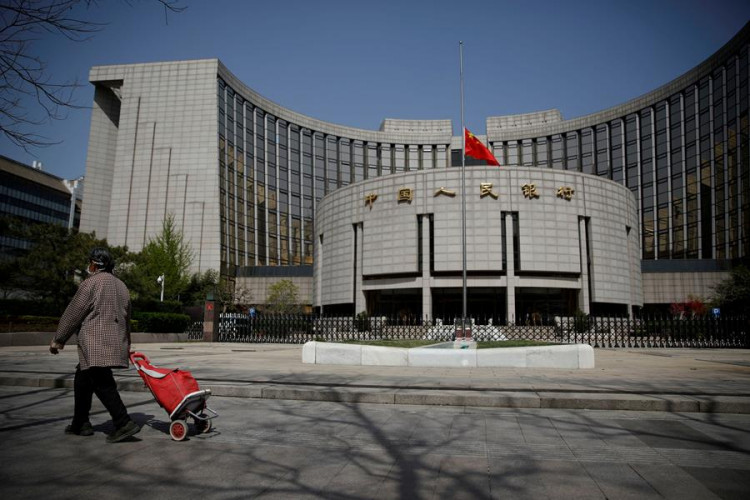China's central bank is maneuvering through one of its most challenging economic landscapes in decades, as it balances efforts to stimulate the economy against risks of destabilizing financial markets and the currency. The People's Bank of China (PBOC) suspended government bond purchases on Friday, a move analysts interpret as a signal to cool overheating bond markets while navigating its limited monetary policy options.
The decision to halt bond buying comes as China grapples with slowing economic growth, weak domestic credit demand, and mounting deflationary pressures. The PBOC attributed the suspension to a scarcity of bonds, but market participants see it as an attempt to curb the rapid decline in yields, which has put downward pressure on the yuan and raised concerns about speculative trading.
Larry Hu, chief China economist at Macquarie, said the PBOC is "trying to cool down the market by suspending [government] bond buying." He noted that the decision reflects concerns over the yuan's depreciation and potential financial instability reminiscent of the U.S. banking turmoil in 2023.
China's 10-year bond yield recently plunged to a record low of 1.64%, widening the gap with the U.S. Treasury 10-year yield, which stands at 4.68%. This discrepancy has made Chinese assets less attractive to global investors, amplifying capital outflow pressures. Zhiwei Zhang, president of Pinpoint Asset Management, noted that the gap "puts pressure on the yuan exchange rate," further complicating the PBOC's policy objectives.
The yuan, which hit its weakest level against the U.S. dollar in over a year earlier this week, strengthened slightly following the PBOC's announcement. The central bank also plans to auction 60 billion yuan in six-month bills in Hong Kong on January 15, a move aimed at signaling its commitment to currency stability.
Taken together with the bond-buying suspension, the PBOC is using a basket of tools to signal yuan stability and support a gradual decline in yields, said Zong Liang, chief researcher at the Bank of China.
The PBOC's limited room for policy maneuvering is evident in its interest rate strategy. The central bank's seven-day reverse repo rate, now its primary benchmark, stands at 1.5% following cumulative cuts of 30 basis points in 2024. Analysts predict a further reduction of up to 40 basis points in 2025, which would represent the most aggressive annual cut since 2015.
"Theoretically, the lower limit of interest rates is zero, as seen in the U.S. and Japan. However, I don't think China's rates will drop to zero," said Larry Hu. He warned that excessive rate cuts could weaken the yuan, spark capital outflows, and create financial bubbles.
The suspension of bond purchases also highlights a shift in the PBOC's approach to monetary policy. Governor Pan Gongsheng had indicated in June that the central bank would increasingly rely on market mechanisms, including buying and selling bonds on the secondary market. However, Friday's move suggests the PBOC is now prioritizing currency and financial stability over aggressive stimulus.
Xu Hongcai, deputy director of the economic policy commission at the China Association of Policy Science, emphasized the need for balance. "A moderately loose monetary policy will involve both interest rate and quantitative measures," he said, adding that excessive currency devaluation could destabilize markets and undermine confidence.
China's economic challenges extend beyond monetary policy. Business confidence remains subdued, and consumer sentiment is near record lows. Net interest margins at banks, a key profitability measure, shrank to an all-time low of 1.53% in the third quarter of 2024.
Brian Tycangco, an analyst at Stansberry Research, noted that the high demand for bonds reflects expectations of substantial stimulus in 2025 to address weak consumption and deflationary pressures. "Unfortunately, suspending buying of bonds will reduce the transparency of pricing in the domestic bond market, making it a little more difficult for market participants to execute orders," he said.
While the PBOC's actions may provide temporary relief to bond markets and stabilize the yuan, long-term questions about the effectiveness of China's monetary policy remain. As incoming U.S. President Donald Trump threatens to increase tariffs on Chinese goods to 60%, the central bank faces the dual challenge of supporting domestic growth while managing external economic pressures.
Zhang Ming, a senior economist at the Chinese Academy of Social Sciences, cautioned against prioritizing currency stability over economic growth. "Sacrificing monetary policy flexibility to maintain exchange rate stability would be a case of putting the cart before the horse," he said.






